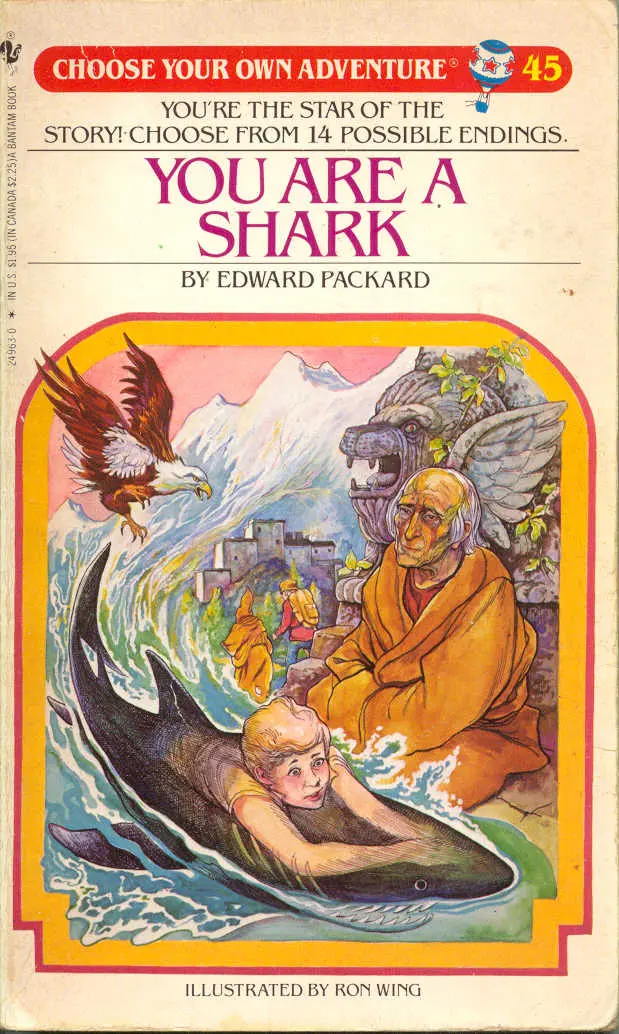I want to make a promise to the readers of LitReactor: I, John Jarzemsky, hereby solemnly swear that my next column will not involve technology, and how it will or will not affect the worlds of books and storytelling. I also promise that I’m not a robot hell-bent on making The Matrix into a reality.
Now that we have that out of the way, I have a few things on my mind: namely, the difference between active and passive narratives, and how they are most often dictated by medium. To clarify, when I say “passive” and “active” I’m referring to the level of agency and involvement afforded to the consumer of a particular narrative. Nearly all narratives fall within the former camp. Be they films, novels, plays or television shows, most media takes the form of a passive narrative: the storyteller tells his story, and the audience listens. His or her reactions to the story have no bearing on the work itself. It was only very recently that active narratives began to enter the collective consciousness in the form of video games.
Heavy Rain is what got me thinking about this (I know I'm late to the party, bear with me). Like many of their peers, the designers of this particular title started with the notion that they wanted to craft a narrative experience that hinged on choices made by the player. While I would argue that Heavy Rain leaves its peers behind in terms of execution, the basic conceit has been alive in the gaming world for a few years now: players are intermittently faced with different choices that have rippling effects on the game’s branching storyline. In theory, this means that any two people who play the game are likely to have completely different experiences, and that anyone should be able to replay the game a number of times, receiving a varied story each time. Practically speaking, the results tend to be a little more clunky, but Heavy Rain is perhaps the closest thing to a playable film noir that is currently available.
With a few exceptions, nearly all other forms of media have steered clear of giving the audience such agency. I’ve been wracking my brain for examples of active narratives outside the medium of video games, and I can only come up with a scant few. Certain forms of live theater use audience participation to change the final outcome of a staged production. There was a brief period in the 1990s when the idea of “graphic adventures” was on everybody’s minds, although these seem laughably bad in hindsight (one example, Dragon’s Lair, constitutes one third of all video games present in The Smithsonian), and despite the use of full-motion-video sequences, they tended to be lumped into the “game” category of entertainment. The closest thing we have in television is the avalanche of “reality competition” shows that hinge on audience voting, although this is a big stretch, since there isn’t really a “narrative” as much as there is “drama”, and it’s impossible to verify the degree to which the audience’s choices are being consciously or subconsciously manipulated. In the world of literature, the only thing that springs to mind are the Choose Your Own Adventure series of books, and these are targeted exclusively towards children.
 Could it be that the very notion of an “active” narrative is considered juvenile and artistically irrelevant in and of itself? Video games, despite having advanced leaps and bounds in terms of both content and presentation, are still not considered “art” by the mainstream media (see Roger Ebert’s fire-starting article, in which he incorrectly uses the term “art” as a signifier of quality), and in the minds of most, are considered little more than a hobby of overgrown children. Ebert’s arguments notwithstanding, it seems that the very notion of inviting the audience to be a part of the craft negates a narrative’s importance in the minds of certain critics. Those who deride the relatively poor and simplistic dialogue, stories, and characters in video games often unfairly overlook the inherent challenge present in attempting to tell a story that is at once engaging and simultaneously modifiable, not to mention the fact that the medium by which game narratives are delivered is constantly changing. If publishing houses were consistently one-upping each other with a new way to present books every two years or so, you can bet that the world of novels wouldn’t be nearly as complex. For the time being though, let’s try a thought experiment. Imagine a work of near unimpeachable quality, like Citizen Kane or The Great Gatsby or The Wire, and imagine that when it was first completed, instead of being a stand-alone, start to finish passive narrative, it sprang into being as a branching, multi-faceted story with different endings available. Imagine that the quality of writing, the richness of the characters, and the quality of the prose hadn’t changed a bit (I realize this may be difficult), but there was only more of the work to explore each time you consumed it. Would the public still regard these pieces of art as favorably, or would the very notion of allowing audience members to influence the unfolding of narrative events taint the work forever?
Could it be that the very notion of an “active” narrative is considered juvenile and artistically irrelevant in and of itself? Video games, despite having advanced leaps and bounds in terms of both content and presentation, are still not considered “art” by the mainstream media (see Roger Ebert’s fire-starting article, in which he incorrectly uses the term “art” as a signifier of quality), and in the minds of most, are considered little more than a hobby of overgrown children. Ebert’s arguments notwithstanding, it seems that the very notion of inviting the audience to be a part of the craft negates a narrative’s importance in the minds of certain critics. Those who deride the relatively poor and simplistic dialogue, stories, and characters in video games often unfairly overlook the inherent challenge present in attempting to tell a story that is at once engaging and simultaneously modifiable, not to mention the fact that the medium by which game narratives are delivered is constantly changing. If publishing houses were consistently one-upping each other with a new way to present books every two years or so, you can bet that the world of novels wouldn’t be nearly as complex. For the time being though, let’s try a thought experiment. Imagine a work of near unimpeachable quality, like Citizen Kane or The Great Gatsby or The Wire, and imagine that when it was first completed, instead of being a stand-alone, start to finish passive narrative, it sprang into being as a branching, multi-faceted story with different endings available. Imagine that the quality of writing, the richness of the characters, and the quality of the prose hadn’t changed a bit (I realize this may be difficult), but there was only more of the work to explore each time you consumed it. Would the public still regard these pieces of art as favorably, or would the very notion of allowing audience members to influence the unfolding of narrative events taint the work forever?
Perhaps the more important question to ask is this: given the pace of technology and the tide of public opinion, is this the direction that all narratives are eventually headed towards? Design by committee tends to yield unmitigated crap, but if recent trends are any indication, consumers are feeling more and more empowered by technology, and it’s not altogether far-fetched to imagine that the public’s demand for involvement will spill over into the world of storytelling. In a sense, Hollywood has been listening more and more to the demands of its audience over the years (somewhat paradoxically, or maybe predictably, nearly everybody I know tends to agree that most movies nowadays are terrible). Snakes on a Plane comes to mind, as does the abominable X-men 3: The Last Stand (“I’m the Juggernaut, bitch!”). It’s still not the norm, but as time goes on, more and more producers and show runners seem to be going back to the age-old adage of “give the people what they want”. Lost had a very prominent feedback loop going in its heyday. That show’s fan base was so loud and strong I remember discussing it in more than one media studies class, and it’s pretty hard to argue that the series wouldn’t have been radically different if nobody who was involved in its creation or consumption had access to the internet, but I’m beginning to digress.
If this indeed is the place that popular entertainment is heading, what does the future hold for books? As recently as five years ago, I would have said that it was hard to imagine books embracing (or being ensnared by, depending on how you look at it) this kind of novel approach to storytelling, but with the advent of the eReader, it seems less than impossible, and maybe even downright likely. Even in their current rudimentary form, it seems like an easy leap to reinvent the “choose your own adventure” line of books into something more adult and contemporary by way of eReaders. The most pressing related question is, will authors be interested in embracing this new storytelling medium? It’s hard to imagine somebody like Cormac McCarthy writing a multi-branched eBook and selling it exclusively on the Internet, but given the pace of current events, the tactics publishers are using to react to technology, and the rate of success that unknowns are having with self-publishing online, it’s more than likely that the next generation of authors who achieve the same literary status as McCarthy (or any other semi-household author) will do so via less traditional methods. And, if audiences continue to want a larger say in the creation/execution of the art they consume, then an altogether new class of writer may very well emerge.
Make no mistakes: this is all very speculative. However, in the current age of RSS feeds, iPads, eReaders, and “games” resembling playable films more and more each year, it’s no exaggeration to say we’re living in the Star Trek era, and the Holodeck is definitely on the horizon. The question is, what role will human beings (you know, the folks who brought you everything) play in all of this, and how do we want to proceed?

About the author
John is a copy editor and contributing writer at LitReactor, and also does work for TwitchFilm.com. He holds a film degree from the University of Texas at Austin, and is currently hard at work on several as-yet unnamed projects.







